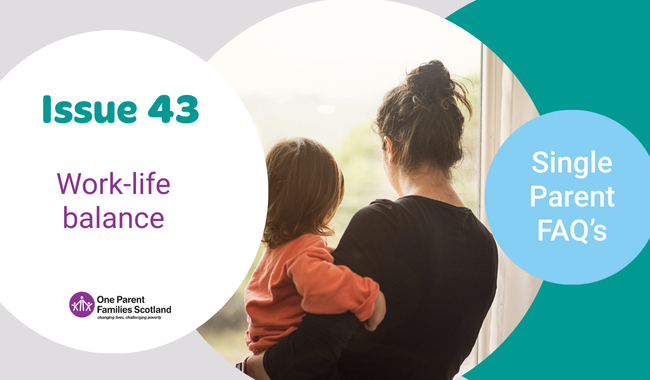Single Parent FAQs: Lone parenting and work-life balance – Issue 43

01/09/2025
Balancing work, childcare and everything else can feel like a juggling act, especially when you’re parenting on your own.
Whether you’re returning to work, or already employed or studying, it’s normal to feel stretched thin. In this issue, we answer your most common questions about managing work-life balance as a single parent in Scotland.
Take a look at the answers to the most frequently asked questions about work-life balance
How can I manage work and parenting on my own without burning out?
You’re not expected to do everything perfectly. It’s important to try and make things manageable where possible:
- Plan your week in advance where possible
- Prioritise essentials, not everything has to get done right away
- Build in small breaks or quiet moments (even 5-10 minutes can help)
- Ask for help from friends, family or local services when you need it
- Try to let go of any guilt you may be feeling,. Remember that you’re doing the best you can with what you have
What are my rights around flexible working in Scotland?
As a parent, you have the legal right to request flexible working if you’ve been with your employer for at least 26 weeks. This could include asking your employer for:
- Part-time hours
- Compressed hours (working full-time hours over fewer days)
- Working from home or hybrid options
- Adjusted start/finish times
Employers must consider your request fairly and explain any refusal. You can also make a request sooner if your employer allows it as part of their internal policy.
What if I need time off for childcare or family emergencies?
You are entitled to time off for dependants, for example, if your child is sick, your childcare falls through, or there’s an emergency at school.
- This time off is usually unpaid unless your contract says otherwise
- You don’t need to give notice, but you should let your employer know as soon as possible
- If you regularly need time off, it might be worth discussing flexible options or family leave
How can I find childcare that fits my work hours?
We know it can be difficult to find childcare. If you’re not sure where to start, consider:
- Funded early learning and childcare (available for all 3-5 year olds and eligible 2 year olds in Scotland)
- Childminders are often more flexible with early starts or late finishes
- Wraparound care including breakfast clubs or afterschool clubs. This can vary widely depending on Local Authority
- Informal help, which can include if you have trusted friends or family nearby
- OPFS can help you find childcare that matches your hours
You may also be eligible for help with costs through Universal Credit or Tax-Free Childcare.
I feel guilty about work, parenting, or both. What can I do?
Guilt is something many single parents experience. It often comes from trying to meet impossible standards. Try to:
- Focus on what you are doing, instead of thinking about what you feel you “should” be doing
- Remember that being a working parent is a form of care, you’re providing for your family
- Keep communication open with your children, even small moments of connection matter
- Talk to other parents. Peer support can be a huge help
Are there any services in Scotland that can help me balance work and parenting?
Support is available. You’re not expected to do this alone.
- One Parent Families Scotland offer employability support, benefits advice and childcare help
- Jobcentre Plus can offer work coaching and help you with finding flexible roles
- Skills Development Scotland offer career advice and training support
- Parentline Scotland offer emotional support for a range of parenting issues

See our previous issues of Single Parent FAQs on:
- Back to school routine
- Summer child contact arrangements
- Supporting children with school transitions
- Managing your mental health
- Having fun on a budget
- Childcare
- Separating
- Scottish Benefits
- Child Maintenance
- Having a Baby
- Back to School
- Child contact arrangements
- Scottish benefits
- Separation
- Having a baby
- Housing options
- Child maintenance
- Child contact
- Universal Credit
- Getting back into education as a single parent
- Financial support for single parents
- Bridging payments and help for Christmas
- Social Security Scotland
- What happens when my child gets older
- Separation and divorce
- Support for students
- Domestic abuse
- When does Child Benefit stop?
- Adult Disability Payments
- Child Maintenance
- What happens when my child gets older (2)
- Cost of Living
- Summer holidays
- What happens when my child gets older
- Universal Credit Managed Migration
Remember you can submit your own question via the Ask A Question feature on our website any time and our expert advisers will respond.
"*" indicates required fields